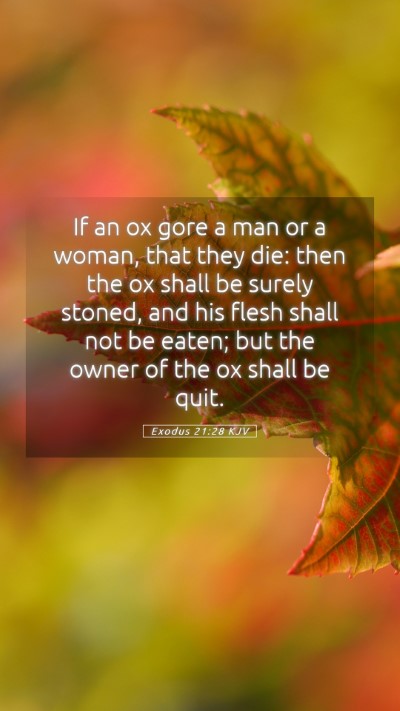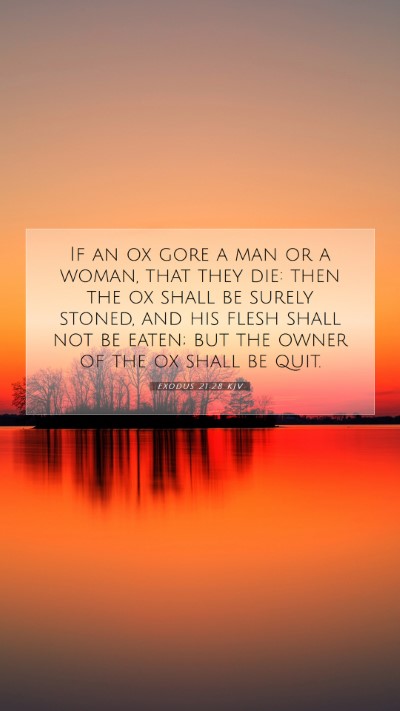Understanding Exodus 21:28
Exodus 21:28 states: "If an ox gore a man or a woman, that they die: then the ox shall be surely stoned, and his flesh shall not be eaten; but the owner of the ox shall be quit." This verse outlines a specific law regarding the accountability of an ox owner when their animal causes harm to a person.
Verse Meaning and Interpretation
This passage serves as a profound revelation about justice and responsibility in the ancient Israelite community. Commentators provide various insights into the implications of this verse.
-
Matthew Henry's Commentary:
Henry emphasizes the principle of justice embedded in this law. The death of a person caused by a goring ox invokes the severe consequence of the animal's death (stoning). This act symbolizes that not only is the owner held accountable, but it also reflects the seriousness of safeguarding human life.
-
Albert Barnes' Notes:
Barnes adds to the discussion by indicating that the neglect leading to the ox's aggressive behavior constitutes a grave offense. The owner must take responsibility, highlighting the importance of due diligence in preventing harm from their property.
-
Adam Clarke's Commentary:
Clarke notes the cultural context surrounding this law. In agrarian societies, animals were crucial for livelihood. Thus, the stoning of the ox demonstrates a balance in justice, ensuring that the owner realizes the weight of their responsibility while also applying a tangible penalty to the animal's actions.
Key Themes in Exodus 21:28
The overarching themes of Exodus 21:28 provide rich material for biblical exegesis and scripture analysis:
- Accountability: The passage illustrates that individuals must ensure proper care for their possessions, indicating that negligence can lead to significant consequences.
- Justice and Retribution: The law emphasizes that justice must be served in accordance with the offense committed, reinforcing moral accountability in the community.
- Protection of Life: The command to stone the ox shows a higher value placed on human life compared to property, establishing a principle that would resonate throughout scripture.
Applications of Exodus 21:28
When studying this verse, one can consider how it applies to modern life:
- Understanding the importance of personal responsibility in all spheres of life.
- The necessity of being vigilant and proactive about preventing harm, whether through our actions or the things we own.
- Recognition of the moral implications behind our responsibilities, guiding us toward ethical decision-making.
Cross References
Exodus 21:28 relates to several other biblical passages, enhancing the understanding of its meaning:
- Leviticus 24:17: Discusses penalties for causing the death of another.
- Deuteronomy 19:21: On the principle of "eye for an eye," which expands on the theme of justice.
- Proverbs 22:3: Advises wisdom in avoiding danger, which reflects on personal responsibility.
Conclusion
In exploring Exodus 21:28, we gain valuable insights into the nature of justice, human responsibility, and the preservation of life. This scripture stands as a testament to the moral framework established in the law and invites readers to reflect on the implications of their actions.


